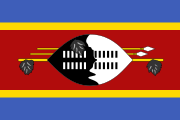Our website is made possible by displaying online advertisements to our visitors.
Please consider supporting us by disabling your ad blocker.
Eswatini
Eswatini (Vollform: Königreich Eswatini, Siswati Umbuso weSwatini, englisch Kingdom of Eswatini,[6][7] kurz eSwatini[8]), bis 2018 offiziell Swasiland, traditionell auch kaNgwane,[8][9] ist ein Binnenstaat im südlichen Afrika mit etwa 1,2 Millionen Einwohnern. Er grenzt an Südafrika und Mosambik. Nationalfeiertag ist der 6. September, der Jahrestag der Unabhängigkeit im Jahr 1968. Die Staatsform ist faktisch eine absolute Monarchie. Die beiden größten Städte des Landes sind die administrative Hauptstadt Mbabane und das wirtschaftliche Zentrum Manzini. Regierungssitz ist Lobamba.
- ↑ Population, total. In: World Economic Outlook Database. Weltbank, 2023, abgerufen am 16. Dezember 2024 (englisch).
- ↑ Population growth (annual %). In: World Economic Outlook Database. Weltbank, 2021, abgerufen am 13. Oktober 2024 (englisch).
- ↑ World Economic Outlook Database October 2024. In: World Economic Outlook Database. Internationaler Währungsfonds, 2024, abgerufen am 16. Dezember 2024 (englisch).
- ↑ Table: Human Development Index and its components. In: Entwicklungsprogramm der Vereinten Nationen (Hrsg.): Human Development Report 2023/2024. United Nations Development Programme, New York 2024, ISBN 978-92-1358870-3, S. 276 (englisch, undp.org [PDF]).
- ↑ SZ. In: ISO 3166 — Codes for the representation of names of countries and their subdivisions. ISO, 16. Juli 2018, abgerufen am 3. Februar 2021 (englisch).
- ↑ Musa Victor Mdabuleni Kunene: Communal Holiness in the Gospel of John: The Vine Metaphor as a Test Case with Lessons from African Hospitality and Trinitarian Theology. Langham Monographs, 2012, ISBN 978-1-907713-23-1, S. 141; eingeschränkte Vorschau in der Google-Buchsuche: “The name ‘Kingdom of Eswatini’ functions equally as the name Swaziland and is favorable to the present King Mswati III as evident in his parliament speeches.”
- ↑ The World Factbook. Potomac Books, 2010, ISBN 978-1-61234-401-0; eingeschränkte Vorschau in der Google-Buchsuche
- ↑ a b James Earl Lassiter: Culture and Personality Aspects of Socioeconomic Development in Swaziland: An Analysis of Student Attitudes and Values. University of Oregon, 1983, S. 28; eingeschränkte Vorschau in der Google-Buchsuche.
- ↑ All About Eswatini/Swaziland. In: Countries. africa.com, 2019, abgerufen am 5. Mai 2021 (englisch).
Previous Page Next Page






